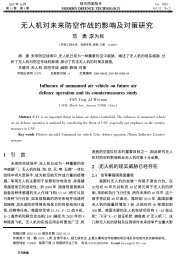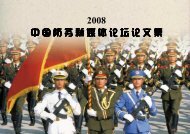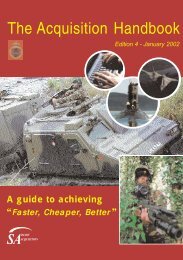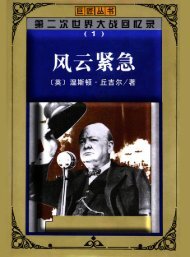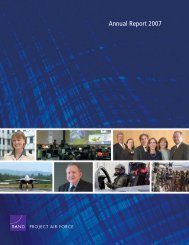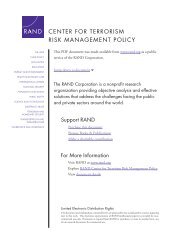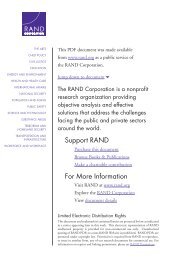- Page 1 and 2:
THE ARTS CHILD POLICY CIVIL JUSTICE
- Page 3 and 4:
HOW TERRORIST GROUPS END Lessons fo
- Page 5 and 6:
About the Authors Seth G. Jones is
- Page 7:
Preface By analyzing 648 groups tha
- Page 10 and 11:
viii How Terrorist Groups End: Less
- Page 13:
Tables 5.1. Insurgent Groups and In
- Page 16 and 17:
xiv How Terrorist Groups End: Lesso
- Page 18 and 19: xvi How Terrorist Groups End: Lesso
- Page 21: Acknowledgments This book would not
- Page 24 and 25: xxii How Terrorist Groups End: Less
- Page 27 and 28: CHAPTER ONE Introduction There has
- Page 29 and 30: Introduction 3 At the core of these
- Page 31 and 32: Introduction 5 The first step was t
- Page 33 and 34: Introduction 7 attention, processin
- Page 35 and 36: CHAPTER TWO How Terrorist Groups En
- Page 37 and 38: How Terrorist Groups End 11 Some ar
- Page 39 and 40: How Terrorist Groups End 13 helping
- Page 41 and 42: How Terrorist Groups End 15 ficient
- Page 43 and 44: How Terrorist Groups End 17 nomic n
- Page 45 and 46: How Terrorist Groups End 19 or kill
- Page 47 and 48: How Terrorist Groups End 21 terrori
- Page 49 and 50: How Terrorist Groups End 23 ended i
- Page 51 and 52: How Terrorist Groups End 25 Consequ
- Page 53 and 54: How Terrorist Groups End 27 Policin
- Page 55 and 56: How Terrorist Groups End 29 ment of
- Page 57 and 58: How Terrorist Groups End 31 Under m
- Page 59 and 60: How Terrorist Groups End 33 that th
- Page 61 and 62: How Terrorist Groups End 35 via vic
- Page 63 and 64: How Terrorist Groups End 37 three s
- Page 65 and 66: How Terrorist Groups End 39 Figure
- Page 67: How Terrorist Groups End 41 Figure
- Page 72 and 73: 46 How Terrorist Groups End: Lesson
- Page 74 and 75: 48 How Terrorist Groups End: Lesson
- Page 76 and 77: 50 How Terrorist Groups End: Lesson
- Page 78 and 79: 52 How Terrorist Groups End: Lesson
- Page 80 and 81: 54 How Terrorist Groups End: Lesson
- Page 82 and 83: 56 How Terrorist Groups End: Lesson
- Page 84 and 85: 58 How Terrorist Groups End: Lesson
- Page 86 and 87: 60 How Terrorist Groups End: Lesson
- Page 88 and 89: 62 How Terrorist Groups End: Lesson
- Page 90 and 91: 64 How Terrorist Groups End: Lesson
- Page 92 and 93: 66 How Terrorist Groups End: Lesson
- Page 94 and 95: 68 How Terrorist Groups End: Lesson
- Page 96 and 97: 70 How Terrorist Groups End: Lesson
- Page 98 and 99: 72 How Terrorist Groups End: Lesson
- Page 100 and 101: 74 How Terrorist Groups End: Lesson
- Page 102 and 103: 76 How Terrorist Groups End: Lesson
- Page 104 and 105: 78 How Terrorist Groups End: Lesson
- Page 106 and 107: 80 How Terrorist Groups End: Lesson
- Page 109 and 110: CHAPTER FIVE Military Force and al
- Page 111 and 112: Military Force and al Qa’ida in I
- Page 113 and 114: Military Force and al Qa’ida in I
- Page 115 and 116: Military Force and al Qa’ida in I
- Page 117 and 118: Military Force and al Qa’ida in I
- Page 119 and 120:
Military Force and al Qa’ida in I
- Page 121 and 122:
Military Force and al Qa’ida in I
- Page 123 and 124:
Military Force and al Qa’ida in I
- Page 125 and 126:
Military Force and al Qa’ida in I
- Page 127:
Military Force and al Qa’ida in I
- Page 130 and 131:
104 How Terrorist Groups End: Lesso
- Page 132 and 133:
106 How Terrorist Groups End: Lesso
- Page 134 and 135:
108 How Terrorist Groups End: Lesso
- Page 136 and 137:
110 How Terrorist Groups End: Lesso
- Page 138 and 139:
112 How Terrorist Groups End: Lesso
- Page 140 and 141:
114 How Terrorist Groups End: Lesso
- Page 142 and 143:
116 How Terrorist Groups End: Lesso
- Page 144 and 145:
118 How Terrorist Groups End: Lesso
- Page 146 and 147:
120 How Terrorist Groups End: Lesso
- Page 148 and 149:
122 How Terrorist Groups End: Lesso
- Page 150 and 151:
124 How Terrorist Groups End: Lesso
- Page 152 and 153:
126 How Terrorist Groups End: Lesso
- Page 154 and 155:
128 How Terrorist Groups End: Lesso
- Page 156 and 157:
130 How Terrorist Groups End: Lesso
- Page 158 and 159:
132 How Terrorist Groups End: Lesso
- Page 160 and 161:
134 How Terrorist Groups End: Lesso
- Page 162 and 163:
136 How Terrorist Groups End: Lesso
- Page 164 and 165:
138 How Terrorist Groups End: Lesso
- Page 167 and 168:
APPENDIX A End-of-Terror Data Set T
- Page 169 and 170:
Table A.1—Continued Organization
- Page 171 and 172:
Table A.1—Continued Organization
- Page 173 and 174:
Table A.1—Continued Organization
- Page 175 and 176:
Table A.1—Continued Organization
- Page 177 and 178:
Table A.1—Continued Organization
- Page 179 and 180:
Table A.1—Continued Organization
- Page 181 and 182:
Table A.1—Continued Organization
- Page 183 and 184:
Table A.1—Continued Organization
- Page 185 and 186:
Table A.1—Continued Organization
- Page 187 and 188:
Table A.1—Continued Organization
- Page 189 and 190:
Table A.1—Continued Organization
- Page 191 and 192:
Table A.1—Continued Organization
- Page 193 and 194:
Table A.1—Continued Organization
- Page 195 and 196:
Table A.1—Continued Organization
- Page 197 and 198:
Table A.1—Continued Organization
- Page 199 and 200:
Table A.1—Continued Organization
- Page 201 and 202:
Table A.1—Continued Organization
- Page 203 and 204:
Table A.1—Continued Organization
- Page 205 and 206:
Table A.1—Continued Organization
- Page 207 and 208:
Table A.1—Continued Organization
- Page 209 and 210:
Table A.1—Continued Organization
- Page 211 and 212:
Table A.1—Continued Organization
- Page 213 and 214:
APPENDIX B Al Qa’ida Attacks, 199
- Page 215 and 216:
Al Qa’ida Attacks, 1994-2007 189
- Page 217 and 218:
Al Qa’ida Attacks, 1994-2007 191
- Page 219 and 220:
Al Qa’ida Attacks, 1994-2007 193
- Page 221 and 222:
Al Qa’ida Attacks, 1994-2007 195
- Page 223 and 224:
APPENDIX C Regression Analysis Usin
- Page 225 and 226:
Regression Analysis 199 Table C.1 P
- Page 227 and 228:
References 9/11 Commission—see Na
- Page 229 and 230:
References 203 ———, “Report
- Page 231 and 232:
References 205 ———, “How al
- Page 233 and 234:
References 207 Gompert, David C., J
- Page 235 and 236:
References 209 Interview with membe
- Page 237 and 238:
References 211 Kosal, Margaret, “
- Page 239 and 240:
References 213 ———, Continued
- Page 241 and 242:
References 215 Parachini, John, “
- Page 243 and 244:
References 217 Rubin, Trudy, “New
- Page 245 and 246:
References 219 United Nations Depar
- Page 247:
References 221 West, Bing, and Owen
- Page 250 and 251:
224 How Terrorist Groups End: Lesso




